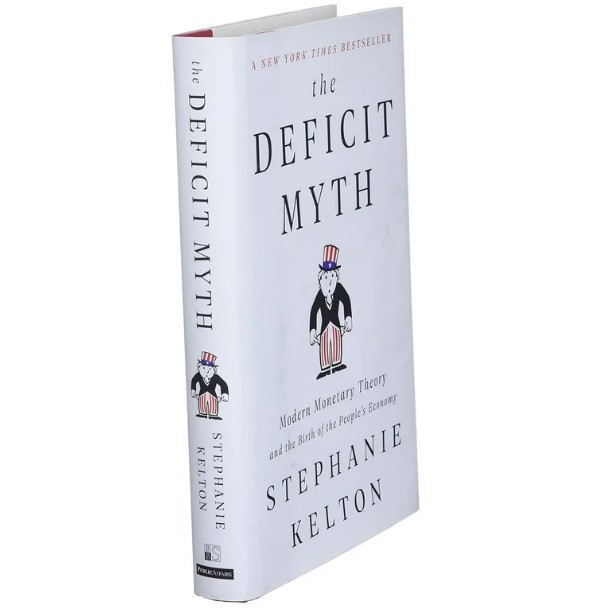This is the first book I’ve ever read on economics—and it was long overdue. For years, I’ve grown tired of hearing about trillion-dollar budget deficits, how “our children and grandchildren” will be left to pick up the tab, and how the nation’s debt is spiraling out of control. Whether it’s at family gatherings, community events, or political discussions, the topic somehow always creeps in. And the fear is always the same: we’re spending too much, and someone will have to pay.
So, I picked up The Deficit Myth by Stephanie Kelton not just to understand the issue better, but to challenge the very premise. Kelton, a former chief economist on the U.S. Senate Budget Committee and advisor to Bernie Sanders, is one of the leading voices behind Modern Monetary Theory (MMT). Her argument is bold: that much of what we’ve been told about deficits, debt, and government spending is simply wrong.
The core idea of MMT, as Kelton explains, is that the U.S. government—being the issuer of its own currency—can never run out of money the way households or businesses can. This doesn’t mean that spending is limitless or that inflation isn’t real, but it does mean that the federal budget shouldn’t be constrained by arbitrary deficit fears. Instead, we should ask: Are we using our financial capacity to meet the needs of the people?
Kelton organizes the book around six central myths that dominate our economic conversations:
- That the federal government should budget like a household.
- That deficits are evidence of overspending.
- That deficits crowd out private investment.
- That government borrowing makes us dependent on China.
- That future generations will bear the burden of today’s debt.
- That programs like Social Security and Medicare are unsustainable.
Each myth is unpacked with logic, data, and real-world examples. What hit me hardest was her reframing of deficits—not as dangerous red ink, but as a reflection of surplus in the private sector. That one concept turned my understanding upside down.
But Kelton doesn’t present this as a free-for-all. She acknowledges the real constraint on spending is inflation—not some moral or mathematical limit tied to a budget. Her argument is that we’ve spent decades worrying about the wrong things, letting fear of deficits keep us from investing in our people and our future.
In that sense, The Deficit Myth is not just a book about economics—it’s about rethinking debt and reclaiming dignity. It invites us to see the federal budget not as a tightrope to be walked, but as a powerful tool to create a more just and equitable society.
Of course, I also recognize that MMT sits on one end of the economic spectrum. Some economists argue that it downplays the risks of inflation or demands too much discipline from our political system. I plan to read from that other side as well—because understanding the full range of thought is key to developing a grounded and thoughtful position.
Even as a newcomer to economic theory, I appreciated how clearly Kelton wrote and how accessible she made the material. What surprised me most was how often economics is used to shut down moral conversations—especially around poverty, healthcare, education, and climate. Instead of asking what people need, we ask how we’ll pay for it. Kelton turns that logic on its head.
She also forced me to reflect on how we measure national success. Take GDP, for example—it measures the total value of goods and services produced, but says nothing about how happy we are, how healthy our communities are, or whether our people feel secure, included, or hopeful. Why isn’t happiness a part of our national equation? Why do we treat a growing GDP as success while ignoring growing inequality, poverty, and despair?
For me, this book isn’t just about economics—it’s a moral lens. What if we measured our economy not by GDP or budget deficits, but by how well we care for our people? What if public spending reflected public values?
Kelton’s message resonates deeply with my belief in a world where justice thrives, and compassion connects us all. The Deficit Myth exposes the myth that keeps us small—and asks us to dream bigger. It’s time to stop asking, “How will we pay for it?” and start asking, “What kind of world are we trying to build?”
If you’re ready to challenge what you’ve been told about money, power, and possibility—this book is for you.


Awesome https://urlr.me/zH3wE5
Thank you. I appreciate the comment.
-Bidrohi
Very good https://is.gd/N1ikS2
Thank you. I appreciate the comment.
-Bidrohi
Very good https://is.gd/N1ikS2
Thank you.